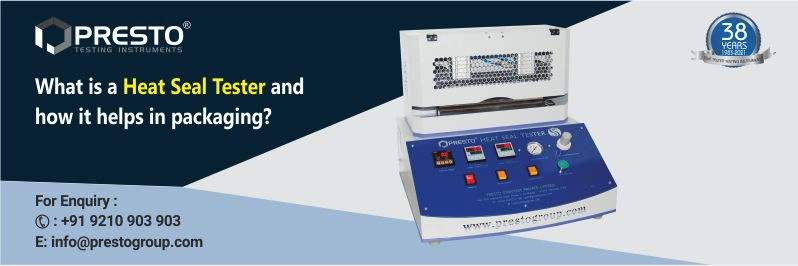A Heat Seal Tester is a device used to evaluate the quality and strength of heat-sealed materials. Heat sealing is a process that joins two surfaces together using heat and pressure. This method is commonly used in industries like food packaging, pharmaceuticals, and medical devices. The heat seal must be strong enough to prevent tampering and protect the contents while remaining easy to open when necessary.
The heat seal tester for packaging helps manufacturers assess the durability and integrity of the seals created by different packaging materials. It measures how much pressure, temperature, and time are required to create a seal that can withstand mechanical stress without breaking or leaking.
How Does a Heat Seal Tester Work?
A Heat Seal Tester operates by simulating the heat-sealing process under controlled conditions. The device typically includes a heated sealing jaw, adjustable pressure settings, and a timer to precisely regulate the sealing process.
Here’s how the testing process works:
- Preparation: The packaging material to be tested is placed between the heated sealing jaws of the Heat Seal Tester. The machine settings, including temperature, pressure, and sealing time, are adjusted according to the material's specifications.
- Sealing: The jaws close and apply heat and pressure to the material, mimicking the actual sealing process used in production. The material is allowed to cool and set, forming the seal.
- Testing: After the seal is created, the Heat Seal Tester measures the strength of the seal. This is usually done by applying force to the seal to see how much pressure it can withstand before breaking. The tester can also measure the peel strength, where one end of the seal is peeled away to determine how much force is required to separate the two layers.
- Analysis: The test results provide data on the effectiveness of the seal, including its strength, uniformity, and consistency. This information helps manufacturers make necessary adjustments to their sealing processes to ensure better performance and quality control.
Importance of Heat Seal Testers in Packaging
The use of heat seal testers for packaging is critical in ensuring that the sealing process meets quality standards, which is vital for protecting the integrity of the packaged products. Here are some key benefits:
- Preventing Contamination: In industries like food and pharmaceuticals, a strong and reliable seal is essential for preventing contamination. A Heat Seal Tester ensures that the seals are intact and will not fail during transportation or storage, which could expose the contents to harmful external elements.
- Enhancing Shelf Life: Properly sealed packaging helps extend the shelf life of products by keeping air, moisture, and bacteria out. A Heat Seal Tester helps optimize the sealing process, ensuring that the packaging is airtight and capable of preserving the product for longer periods.
- Ensuring Product Safety: In sectors where product safety is paramount, such as pharmaceuticals and medical devices, the quality of heat seals is directly linked to consumer safety. A Heat Seal Tester allows manufacturers to verify that the packaging meets regulatory standards, reducing the risk of product recalls or safety issues.
- Improving Packaging Efficiency: Regular testing with a Heat Seal Tester helps manufacturers optimize their sealing processes. By understanding the ideal temperature, pressure, and time for sealing different materials, companies can reduce waste, lower production costs, and improve overall efficiency.
- Maintaining Brand Reputation: Packaging failures can lead to damaged products, customer dissatisfaction, and a tarnished brand reputation. Using a Heat Seal Tester ensures that packaging materials are reliable and up to standard, helping brands maintain consumer trust and loyalty.
Choosing the Right Heat Seal Tester for Packaging
When selecting a heat seal tester for packaging, several factors should be considered to ensure it meets the specific needs of your industry:
- Material Compatibility: Different packaging materials, such as plastic films, aluminum foils, and laminated composites, require varying levels of heat and pressure for effective sealing. A versatile Heat Seal Tester should be able to accommodate different materials and provide precise control over the sealing parameters.
- Test Accuracy: The accuracy of the testing results is crucial for making informed decisions about your packaging process. Choose a Heat Seal Tester that offers reliable and repeatable results, ensuring that your seals meet the necessary strength and integrity standards.
- Ease of Use: An intuitive interface and easy-to-use features are important for efficient testing. The tester should allow operators to quickly set the desired parameters and conduct tests with minimal effort, reducing downtime and increasing productivity.
- Durability and Maintenance: A durable Heat Seal Tester built with high-quality components will offer long-term reliability. Additionally, regular maintenance is essential to keep the machine functioning optimally, so look for models that are easy to clean and service.
Conclusion
A heat seal tester for packaging is an essential tool for ensuring the quality, durability, and safety of heat-sealed packaging. By providing precise control over the sealing process and delivering accurate testing results, a Heat Seal Tester helps manufacturers maintain high standards in product protection and packaging performance. Investing in a reliable tester not only enhances product quality but also contributes to brand reputation and operational efficiency.





Comments